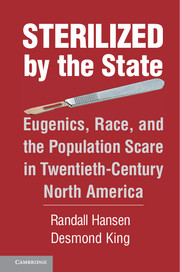6 - Buck v. Bell and Beyond
Published online by Cambridge University Press: 05 June 2014
Summary
In March 1924, seventeen-year-old Carrie Buck gave birth to a baby girl named Vivian in Charlottesville, Virginia. On June 4, the young mother departed for Lynchburg with her social worker, leaving the baby with her foster parents, John T. and Alice Dobbs. After the ninety-minute train journey, the social worker, Caroline Wilhelm, signed Carrie over to the care of the State Colony for Epileptics and Feebleminded and its superintendent, Dr. Albert Priddy. Carrie’s committal to the institution was the recommendation of two court-appointed physicians assigned to her when her pregnancy became known. The doctors agreed with her foster parents’ view that Carrie was feebleminded, as defined in state law, and concurred that she be moved to the State Colony after she gave birth. Despite this segregation from society, however, Carrie would not be completely alone: her mother, Emma, had already been committed to the Colony in 1920. Emma spent the remainder of her life in the institution until she died in 1944, aged seventy-one.
Priddy used the law recently passed by the Virginian state legislature authorizing the involuntary sterilization of the feebleminded or the “socially inadequate” to recommend this treatment for Carrie. There was nothing surprising in this; it was effectively his law. Priddy had lobbied lawmakers and worked with the Colony’s chief administrator, Aubrey Strode – a state legislator and the author of the bill that had established the State Colony – to draft the sterilization bill and to see it through the legislature. The two men were close colleagues: Priddy had discharged the delicate task of conducting a confidential medical examination of Strode’s fiancée, who was also an unreserved eugenicist, to determine if she could have children.
- Type
- Chapter
- Information
- Sterilized by the StateEugenics, Race, and the Population Scare in Twentieth-Century North America, pp. 102 - 116Publisher: Cambridge University PressPrint publication year: 2013



